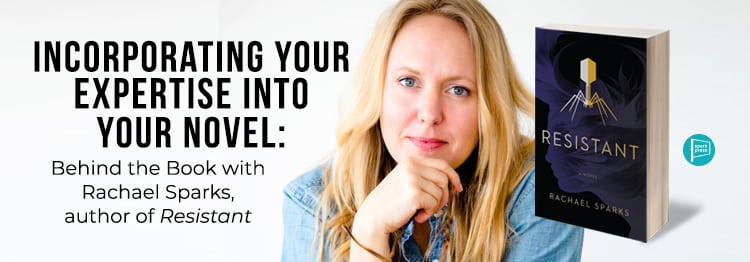
When I began threading the needle of writing antibiotic resistance into the driving plot mechanism for my novel, Resistant, I faltered by using too much of my science expertise for my beta readers to appreciate. I lost a lot of confidence when early feedback agreed on that weakness in my writing. My husband’s spectacular advice was that, while it was good, it needed a guide. “Think Mr. DNA in Jurassic Park,” he said, “or at least throw in a character who needs something explained simply, and let an expert character serve up that translation.”
It’s easy, as a new writer, to tumble down the rabbit hole of self-doubt. Culturally, we tend to believe that to be good at something, you need to have either expensive graduate school training or tremendous hours of practice. Both of these influences can make for a great writer. However, one’s natural style of writing is also influenced by everything you read, all your past experiences, and your temporal reality: where do you exist in time and place? You might be a young mind in a middle-aged body. Or perhaps you’re a young person who can imagine exactly how it would feel to be a woman in Regency England. What new authors should remember is that you’re building your writing muscles now. And one great way to exercise is to write what you know.
Incorporating your experiences and expertise can help build a realistic world in your novel. The details that exist in your mind from memories, training, or education translate easily for you, and are often the ones you’ve explained before, supplying a rich vocabulary to explore.
For me, the science of microbiology, diseases, epidemiology, and hospital settings are topics I routinely explain to others in the course of my job and life. But I also have past careers that inform other parts of my plots, subplots, characters. Not surprisingly, my work hews to the science-fiction end of the fiction spectrum; however, the more confidence I build in my writing through weaving in what I’m already an expert on, the more encouraged I am to write on any topic. Authors like Grisham, Crichton, and Le Carré used their specialties—law, medicine, and espionage, respectively—as a launch point into creating fictitious situations, characters, and plot twists.
If you feel your area of expertise isn’t showing up in your writing, or has no place there, you may be thinking too narrowly. Ask yourself these questions as an experiment:
- What topic do I feel most confident and passionate about in conversation? Now think of a chapter built around that topic, just a single chapter, and work backwards. What might lead a character to explain that? You may discover the inner workings of a character’s passions and motivations in the simple explanation of how a problem is solved or where certain processes go wrong.
- When I’m telling a funny or moving story to a group of acquaintances, what is a story I’ve told most often?We all have those tales that we use to capture laughs or “wows” in social situations. Write that experience into a brief encounter between characters. Now change it and view it from another perspective, make it funnier, or sadder, or end differently. This story is yours, so treat it like a masterpiece . . . made of play-dough.
- Fill in this sentence: People always ask me ________ about my job. This answer may be the most boring topic to you—as a microbiologist, my reply is, “No, I am not a germaphobe. I actually love bacteria and am especially grateful for wine, cheese, and kimchi.” However, what’s boring to you is clearly of interest to others. Now write it into a conversation from the point of view of the person asking. Then answer the question the opposite way you normally would, inverting your own take on it while preserving the knowledge you bring.
Hopefully these little games may show you just where your expertise could brighten your writing, inspire new personas to build from, or derail a plot that’s going a little too smoothly. Be it the grease, a nail, or a jackhammer, your expertise belongs in your writing toolkit.

Leave A Comment